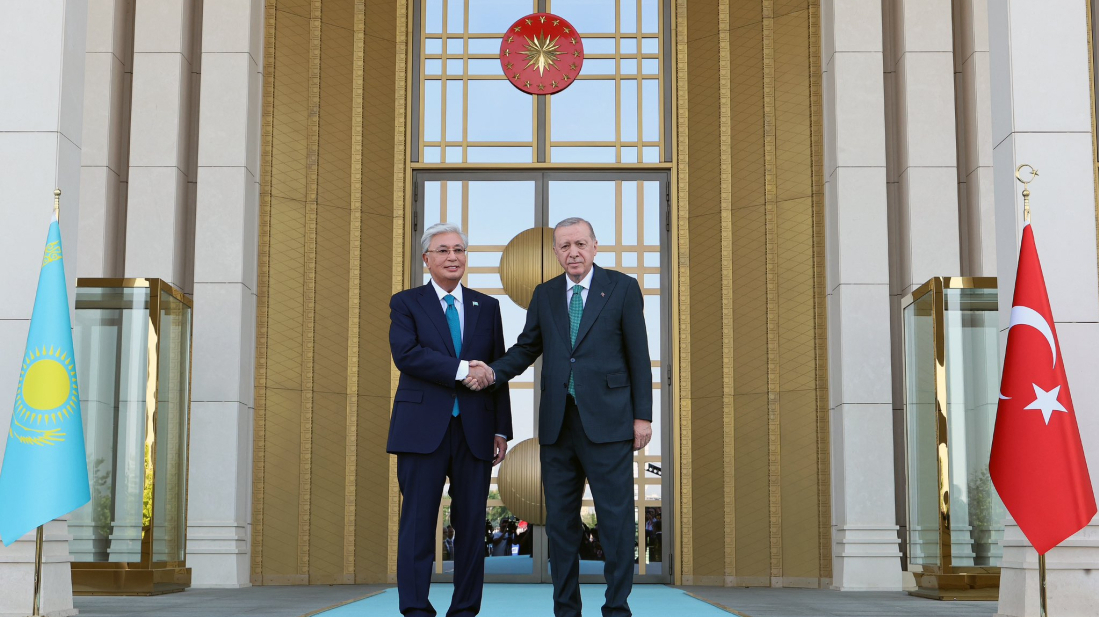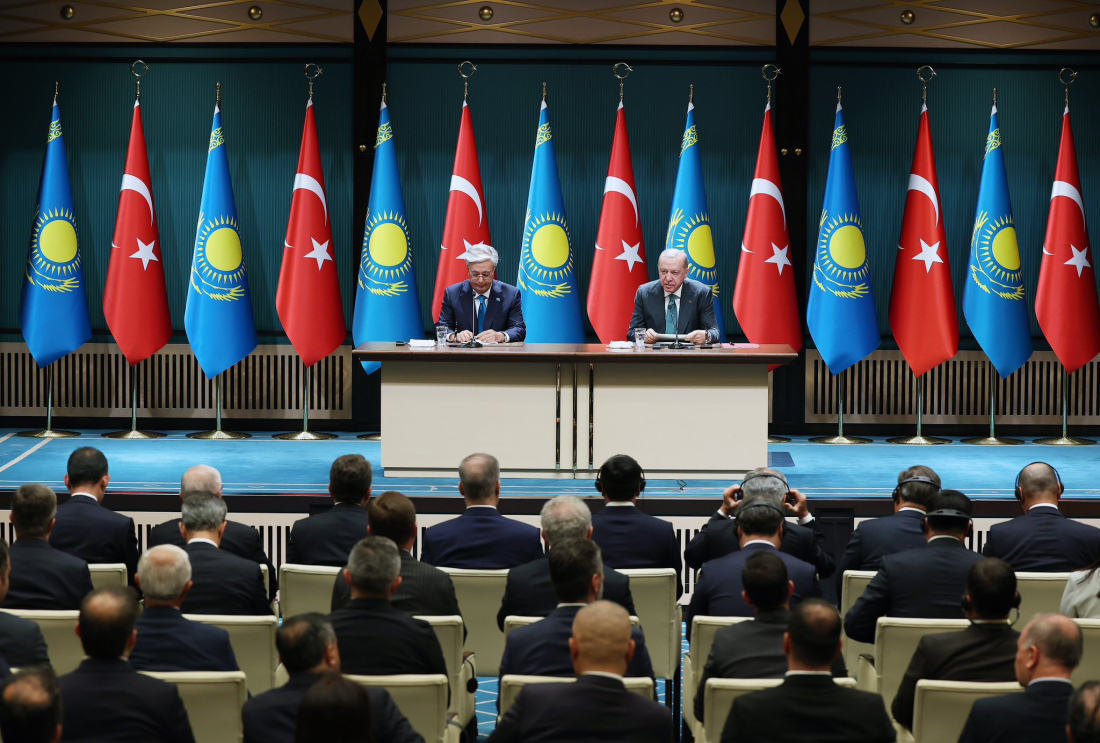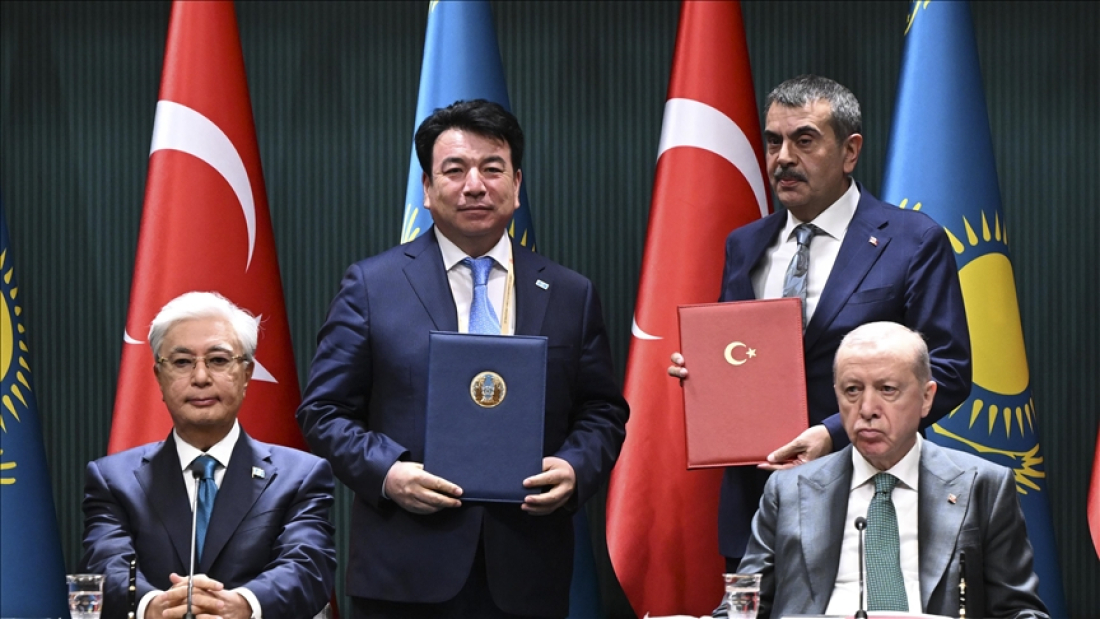Iran stores highly enriched uranium underground, IAEA says
Some of Iran's most highly enriched uranium, close to weapons grade, was stored in an underground area of its nuclear site in Isfahan, the UN nuclear ...

A two-day official visit by Kazakh President Kassym-Jomart Tokayev to Türkiye concluded with the signing of 20 agreements aimed at expanding the strategic partnership between the two countries in key areas, including mining and rare earth minerals, space and technology, energy, and logistics.
President Tokayev reaffirmed that Türkiye is one of Kazakhstan’s key strategic partners in trade, economic cooperation, and investment, stating: “As a reliable partner, we remain ready to support Turkish investors and warmly invite your companies to participate in large-scale, long-term projects.”
"Kazakhstan is the largest economy in the region and our biggest trading partner in the area. We have set a target of reaching a trade volume of $15 billion," stated Turkish President Recep Tayyip Erdoğan in a post on his official X page.
He noted that the two leaders exchanged views on a broad range of topics—including defence, energy, transportation, and science and technology—which culminated in the signing of 20 bilateral documents.
"We explored cooperation opportunities in sectors such as mining and rare earth elements. We also discussed how to enhance the use and development of the Middle Corridor via the Caspian Sea, which serves as the modern-day equivalent of the Silk Road. In addition, we reviewed concrete projects that will further advance our military and defence industry cooperation," the Turkish leader emphasized.

According to Kazakhstan’s Presidential Office, bilateral trade turnover between Kazakhstan and Türkiye reached $5 billion in 2024. Currently, around 4,000 Turkish companies operate in Kazakhstan, having implemented projects worth $6 billion across key sectors including energy, construction, industry, agriculture, infrastructure, healthcare, and tourism. At the same time, Kazakhstani investments in Türkiye have surpassed $2.5 billion.
President Tokayev welcomed Türkiye Petroleum’s intention to operate in the Kazakh market, noting that both sides discussed opportunities to increase Kazakh oil exports via the Baku–Tbilisi–Ceyhan pipeline, which currently stands at 1.4 million tons.
“We are also interested in leveraging the investment potential of Turkish companies and their experience in diversifying energy sources and constructing power plants. Kazakhstan is ready to jointly implement large-scale projects in this area,” he added.
Kazakh leader stressed that the two countries should fully capitalize a strategic geographic advantage, stating: “Approximately 85% of overland cargo between Europe and China passes through Kazakhstan. In this context, the development of the Trans-Caspian International Transport Route, also known as the Middle Corridor, is of particular importance. Kazakhstan is actively modernizing its railway network, constructing new roads, and upgrading infrastructure to enhance shipping across the Caspian Sea.”
He invited Turkish investors to actively participate in these projects and pledged to offer special incentives to Turkish entrepreneurs.

Among the key documents signed were:
Joint Declarations:
President Tokayev and President Recep Tayyip Erdoğan signed both the Decision of the Fifth Meeting of the Türkiye–Kazakhstan High-Level Strategic Cooperation Council and the Joint Statement following the meeting.
Energy and Natural Resources:
A cooperation agreement between Turkish Petroleum Corporation and NC KazMunayGas JSC was signed by TPAO Chair Ahmet Türkoğlu and KazMunayGas Chair Askhat Khassenov.
Two memorandums of understanding (MoUs) were signed in energy and mining between Türkiye’s Ministry of Energy and Natural Resources and Kazakhstan’s relevant ministries.
Transport and Logistics:
A cooperation agreement for freight transportation via the Middle Corridor railway route was signed by Turkish Railways CEO Ufuk Yalçın, Pacific Eurasia Logistics Deputy Chair Erol Erkan, and Kazakhstan Temir Zholy Chair Talgat Aldybergenov.
An MoU on cooperation in international road transport was signed by Turkish Transport and Infrastructure Minister Abdulkadir Uraloğlu and Kazakh Transport Minister Nurlan Sauranbayev.
Finance and Economic Development:
An MoU between the Turkish Banking Regulation and Supervision Agency (BDDK) and Kazakhstan’s Financial Market Regulation and Development Agency was signed by BDDK Head Şahap Kavcıoğlu and his Kazakh counterpart, Madina Abylkassymova.
Additional MoUs were signed between Türkiye’s Trade Ministry and Kazakhstan’s ministries overseeing trade, integration, and industrial development, including a declaration of intent on cooperation in free/special economic zones.
Science, Technology, and Innovation:
An MoU on cooperation in artificial intelligence, innovation, and space activities was signed by Türkiye’s Industry and Technology Minister Mehmet Fatih Kacır and Kazakhstan’s Digital Development Minister Jaslan Madiyev.
A separate implementation protocol on science and technology cooperation was signed by Minister Kacır and Kazakh Education Minister Gani Beisembayev.
Health Sector Cooperation:
Multiple MoUs were signed between the Turkish and Kazakh health ministries, focusing on drug and medical device regulation, as well as research collaboration.
Media and Communications:
A cooperation agreement between Anadolu Agency and Kazakhstan’s Presidential Television and Radio Complex (TRC) was signed by Anadolu CEO Serdar Karagöz and TRC Director Raushan Kazhibayeva.
An MoU on cooperation in media and information was signed between the Turkish Presidency’s Communications Directorate and Kazakhstan’s Central Communication Service.
Education:
An MoU to launch educational activities in Kazakhstan was signed by the Turkish Maarif Foundation and Kazakhstan’s Ibray Altinsarin National Education Academy.
Urban Planning and Justice:
Türkiye and Kazakhstan signed MoUs on cooperation in urban planning and justice, involving ministers from both countries’ respective departments.
Defense and International Peacekeeping:
A technical agreement on cooperation within the framework of the United Nations Interim Force in Lebanon (UNIFIL) was signed by Turkish National Defense Minister Yaşar Güler and Kazakh Deputy Prime Minister and Minister of National Economy Serik Zhumangarin.
These agreements are expected to significantly enhance bilateral relations and facilitate concrete cooperation in both public and private sectors. The strategic dialogue reflects a shared vision for long-term regional cooperation, economic growth, and security alignment.
The death toll from heavy rains and flooding in Brazil’s Minas Gerais state has risen to 46, authorities said, with 21 people still reported missing. The storms triggered landslides and widespread flooding, displacing thousands across Juiz de Fora and Uba.
The situation in Cuba was heating up and called for restraint following a deadly incident involving a Florida-registered speedboat off the coast of the Caribbean island, the Kremlin said on Thursday (26 February).
Syria’s economy is showing clear signs of recovery, with economic activity accelerating in recent months, the International Monetary Fund (IMF) said on Wednesday.
The United States has deployed the aircraft carrier USS Gerald R. Ford near Israel as part of a growing military build-up amid tensions with Iran, while governments around the world urge their citizens to leave parts of the region.
Pakistani air strikes hit a weapons depot on the western outskirts of Kabul overnight, triggering hours of secondary explosions that rattled homes across the Afghan capital and left residents fearing further violence.
Pakistani air strikes hit a weapons depot on the western outskirts of Kabul overnight, triggering hours of secondary explosions that rattled homes across the Afghan capital and left residents fearing further violence.
Israeli strikes killed five people in Gaza on Thursday (26 February), according to health officials in the territory. The Israeli military said separately that it had killed a militant who posed an imminent threat to its forces in southern Gaza.
Iran’s Foreign Minister Abbas Araghchi on Friday urged Afghanistan and Pakistan to resolve their differences through dialogue, offering Tehran’s assistance to facilitate understanding between its eastern neighbours.
Ankara has rejected media reports claiming it plans to deploy military forces into Iranian territory in the event of a U.S. attack on the Islamic republic.
Georgia’s path towards European Union membership is facing its most serious crisis to date, with senior European lawmakers warning that the country is now a “candidate in name only” and accusing the ruling government of reversing democratic progress and drifting away from Europe.
You can download the AnewZ application from Play Store and the App Store.

What is your opinion on this topic?
Leave the first comment